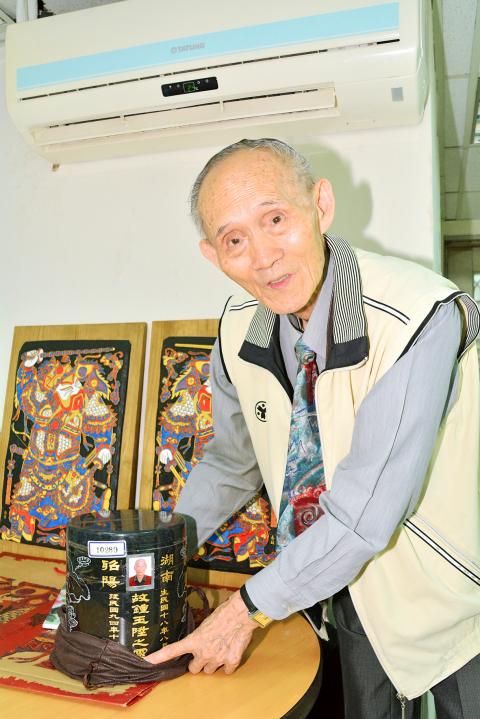An 81-year-old lawyer who came to Taiwan with the Chinese Nationalist Party (KMT) when he was 13 said in an interview with China’s CCTV that he is full of “bitterness” that his four grandchildren are all “little Taiwan independence [supporters].”
Kao Ping-han (高秉涵), who was born in China’s Shandong Province in 1935, took his family to China in July to “find their roots,” and during the trip he was followed by a group of Chinese reporters.
Kao is famous in China after he received the “Moving China” award in 2012 for his efforts in helping more than 100 veterans’ families take their loved ones’ ashes to China after they passed away in the past 20 years.

Photo: CNA
In the interview, Kao said he had taken his grandchildren to China so that they could learn more about Chinese culture, and visit the Yellow River and famous mountains “that are in their textbooks.”
“I want them to look at them for real. They think that those belong to China and have nothing to do with Taiwan,” Kao said.
When a journalist asked Kao’s 10-year-old grandchild: ‘Are you Chinese?’ she replied: ‘No, my grandpa is Chinese; I’m Taiwanese,’” Kao said.
“I’m full of bitterness,” Kao said.
The CCTV reporter said she could not understand how “that kind of situation emerged” among his grandchildren.
To the reporter’s puzzlement, Kao said it was due to “so-called Taiwanese cultural independence.”
“After [former president] Chiang Ching-kuo (蔣經國) died, [former president] Lee Teng-hui (李登輝) implemented ‘desinicization’ during his eight years of presidency, which was followed by [another eight years of former president] Chen Shui-bian (陳水扁). There had been nearly 20 years of ‘desinicization,’” Kao said.
“There is nothing I can do; those who voted for [President] Tsai Ing-wen (蔡英文) are exactly those ‘little Taiwan independence [supporters]’ who started [to form] 20 years ago,” Kao said.
“Taiwan itself has no culture, as it is part of the Zhonghua minzu [Chinese ethnic group, 中華民族]; its culture is China’s culture, but what the Democratic Progressive Party has taught them is to believe that Taiwan belongs to the Aborigines,” he said. “I asked one of my granddaughters which is the longest river in our country and she said it was the Tamsui River, when I expected her to say the Yangtze or the Yellow River, which she said are not Taiwanese rivers. They will not say Taiwan is a nation, a notion they have not yet acquired, but [they simply say] they are Taiwanese.”
“I’m doing my job as everybody has to when the nation is in trouble,” Kao said in response to reporters’ queries as to how he could change the trend by himself. “By bringing my grandchildren [to China] I want them to recognize their ancestors and remove from them this independence [thinking].”

Taiwan is to commence mass production of the Tien Kung (天弓, “Sky Bow”) III, IV and V missiles by the second quarter of this year if the legislature approves the government’s NT$1.25 trillion (US$39.78 billion) special defense budget, an official said yesterday. Commenting on condition of anonymity, a defense official with knowledge of the matter said that the advanced systems are expected to provide crucial capabilities against ballistic and cruise missiles for the proposed “T-Dome,” an advanced, multi-layered air defense network. The Tien Kung III is an air defense missile with a maximum interception altitude of 35km. The Tien Kung IV and V

The disruption of 941 flights in and out of Taiwan due to China’s large-scale military exercises was no accident, but rather the result of a “quasi-blockade” used to simulate creating the air and sea routes needed for an amphibious landing, a military expert said. The disruptions occurred on Tuesday and lasted about 10 hours as China conducted live-fire drills in the Taiwan Strait. The Civil Aviation Administration (CAA) said the exercises affected 857 international flights and 84 domestic flights, affecting more than 100,000 travelers. Su Tzu-yun (蘇紫雲), a research fellow at the government-sponsored Institute for National Defense and Security Research, said the air

A strong continental cold air mass is to bring pollutants to Taiwan from tomorrow, the Ministry of Environment said today, as it issued an “orange” air quality alert for most of the country. All of Taiwan except for Hualien and Taitung counties is to be under an “orange” air quality alert tomorrow, indicating air quality that is unhealthy for sensitive groups. In China, areas from Shandong to Shanghai have been enveloped in haze since Saturday, the ministry said in a news release. Yesterday, hourly concentrations of PM2.5 in these areas ranged from 65 to 160 micrograms per cubic meter (mg/m³), and pollutants were

Taiwan’s armed forces have established response protocols for a wide range of sudden contingencies, including the “Wan Chun Plan” to protect the head of state, the Ministry of Defense (MND) said today. After US President Donald Trump on Saturday launched a series of airstrikes in Venezuela and kidnapped Venezuelan President Nicolas Maduro, concerns have been raised as to whether China would launch a similar “decapitation strike” on Taiwan. The armed forces regularly coordinate with relevant agencies and practice drills to ensure preparedness for a wide range of scenarios, Vice Minister of National Defense Hsu Szu-chien (徐斯儉) told reporters before a